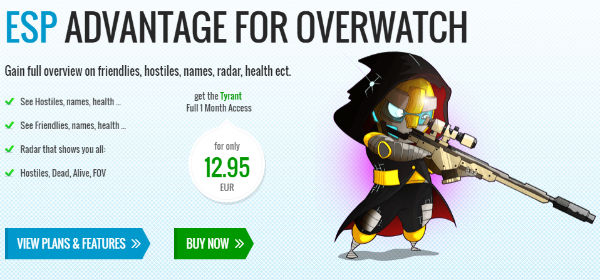Blizzard Entertainment is suing Bossland, the maker of the popular Overwatch cheat tool "Watchover Tyrant" and several other game cheats. Among other things, the developer accuses the German company of various forms of copyright infringement and unfair competition.
Over the years video game developer Blizzard Entertainment has published many popular game titles.
Most recently the company released the new first-person shooter Overwatch, which became an instant bestseller. The game received rave reviews and generated hundreds of millions of dollars in revenue during its first weeks on sale.
While most Overwatch players stick to the rules, theres also a small group that tries to game the system. By using cheats such as the Watchover Tyrant, they play with an advantage over regular users.
Blizzard is not happy with the Overwatch cheat and has filed a lawsuit against the German maker, Bossland GMBH, at a federal court in California. Bossland also sells cheats for various other titles such as World of Warcraft, Diablo 3 and Heroes of the Storm, which are mentioned in the complaint as well.
The game developer accuses the cheat maker of various forms of copyright infringement, unfair competition, and violating the DMCAs anti-circumvention provision.
According to Blizzard these bots and cheats also cause millions of dollars in lost sales, as they ruin the games for many legitimate players.
Defendants sale and distribution of the Bossland Hacks in the United States has caused Blizzard to lose millions or tens of millions of dollars in revenue, and to suffer irreparable damage to its goodwill and reputation.
Moreover, by releasing Overwatch Cheat just days after the release of Overwatch, Defendants are attempting to destroy or irreparably harm that game before it even has had a chance to fully flourish.
The Overwatch cheat has already become relatively popular in a short period of time. Thousands of players are reportedly using the tool, which enables them to display the locations and health status of hidden or obscured opponents.
Blizzard believes that by developing the cheats, Bossland has infringed on its copyrights in various ways. Among other things, the complaint accuses the German cheat maker of contributory copyright infringement.
They have done so by enabling and encouraging third-party freelancers or contractors to fraudulently obtain access to the Blizzard Games and then, having done so, to engage in unauthorized reproduction of the Blizzard Games, the complaint reads.
They also have done so by enabling users of the Bossland Hacks (particularly the Overwatch Cheat) to use the software to create derivative works, such as the dynamic screen overlay generated by the Overwatch Cheat, it adds.
Blizzard notes that it has already taken action against thousands of cheaters. I
n response, Bossland announced that they would make their tool harder to be detected, which suggests that they intentionally violate the games EULA.
The game developer adds that the various cheats and bots may have generated millions in revenue for the German company, and demands compensation for its losses.
Defendants not only know that their conduct is unlawful, but they engage in that conduct with the deliberate intent to harm Blizzard and its business. Blizzard is entitled to monetary damages, injunctive and other equitable relief, and punitive damages against Defendants, the complaint reads.
Aside from the Overwatch cheat, the current case is very similar to one filed against a freelancer who works for Bossland. This case never really took off and was dismissed earlier this year.
TF spoke with Bossland CEO Zwetan Letschew, who informed us that his company hasnt received the complaint at its office yet. However, they are no stranger to Blizzards legal actions.
There are over 10 ongoing legal battles in Germany already, Letschew says, noting that its strange that Blizzard decided to take action in the US after all these years.
Now Blizzard wants to try it in the US too. One could ask himself, why now and not back in 2011. Why did Rod Rigole [Blizzard Deputy General Counsel] even bother to fly to Munich and drive with two other lawyers 380 km to Zwickau. Why not just sue us in the US five years ago?
While Letschew still isnt convinced that the lawsuit is even real, he doesnt fear any legal action in the U.S. According to the CEO, a California court has no jurisdiction over his company, as it has no ties with the United States.
In addition, he is supported by a lawsuit his company won in Germany against Blizzard earlier this year. In that case, which dealt with the Heroes of the Storm bot, Blizzard was ordered to pay Bosslands legal costs and attorney fees.
The full complaint filed at the Central District Court of California is available
here (pdf).






